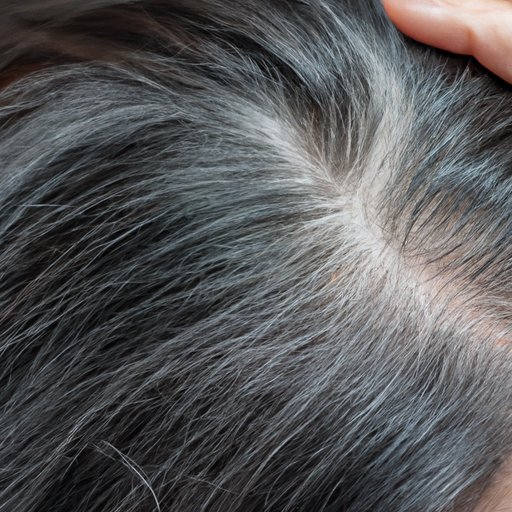
Introduction
Premature greying is a common problem among both men and women, and it can be a source of frustration and embarrassment. While there are many factors that can contribute to premature grey hair, stress is a well-known culprit that is often discussed. But is there actually a link between stress and grey hair? In this article, we’ll explore the scientific evidence, personal accounts, health and wellness tips, and debunk some common myths surrounding this topic.
Exploring Scientific Evidence
Several studies have explored the potential link between stress and grey hair. One study published in Nature found that stress can cause permanent damage to melanocyte stem cells, which are responsible for producing pigment in hair follicles. This damage can result in pigment loss and premature greying.
Other expert opinions and statistics also support the concept that stress can cause grey hair. Dr. Tyler Cymet, head of family medicine at Sinai Hospital in Baltimore, suggests that stress-induced changes in hormone levels can trigger premature greying. Additionally, a 2018 study published in the International Journal of Trichology found that individuals with premature greying were more likely to experience high levels of perceived stress compared to those with no greying.
Personal Accounts
While scientific evidence is important, personal accounts can also shed light on the link between stress and grey hair. Many individuals have shared their stories about experiencing premature greying as a result of stressful events in their lives.
For example, a woman named Sarah shared her experience with premature greying on the website Psychology Today. She explained how her mother’s death led to an overwhelming amount of stress, and within months, her hair went from a dark brown to almost completely grey. Another individual named Michael shared his story with premature greying brought on by an intense workload and constant travel for his job.
Health and Wellness Tips
While there is no surefire way to prevent grey hair, managing stress can help reduce the likelihood of premature greying. Some techniques for managing stress include practicing meditation or yoga, maintaining a regular sleep schedule, engaging in regular physical activity, and seeking support from friends or a mental health professional when needed.
In addition to stress management, lifestyle habits can also promote mental and emotional well-being and hair health. A well-balanced diet rich in vitamins and minerals can help support hair health, as can regularly washing and conditioning hair with gentle products and avoiding excessive heat styling and harsh chemical treatments.
Debunking Myths
There are many myths surrounding grey hair and stress that can cause confusion and misinterpretation. One common myth is that plucking a grey hair will cause two to grow back in its place, but this is simply not true. Another myth is that stress is the sole cause of grey hair, but genetics also play a significant role.
While stress can contribute to premature greying, it’s important to recognize that it’s not the only factor. Lifestyle habits and genetics can also play a significant role in the development of grey hair.
The Role of Genetics
Genetics play a significant role in determining an individual’s susceptibility to premature greying. If an individual has a family history of premature greying, they may be more likely to experience it themselves. However, stress can still play a role in the development of grey hair even in individuals with a genetic predisposition.
According to Dr. Adam Kingsley, a hair restoration specialist, “While genetics plays a significant role in whether or not an individual is prone to premature greying, there is strong anecdotal evidence to suggest that stress can speed up the process in those who are already predisposed.”
Conclusion
While the relationship between stress and grey hair is complex, scientific evidence and personal accounts suggest that stress can contribute to premature greying. However, managing stress and maintaining healthy lifestyle habits can help reduce the likelihood of premature greying and promote overall wellness. It’s important to recognize that genetics also play a significant role in the development of grey hair, and not all individuals will experience it due to stress alone.
By understanding the potential link between stress and grey hair, individuals can take steps to manage stress in their daily lives and promote hair health.




